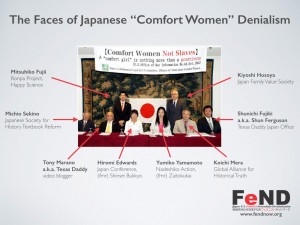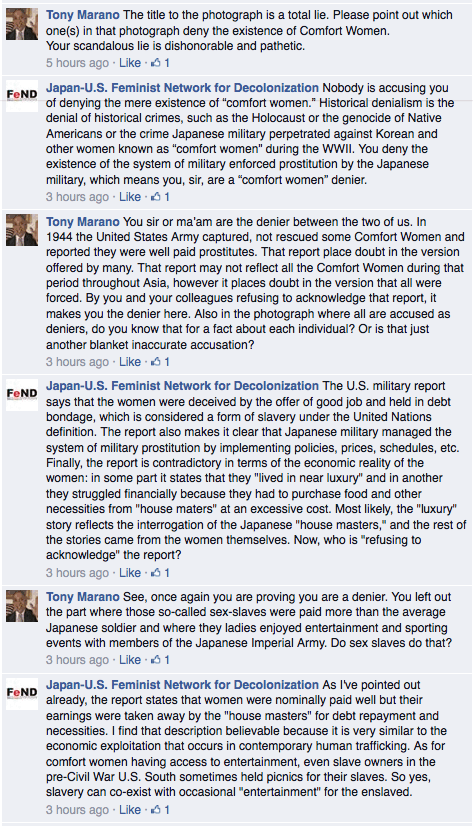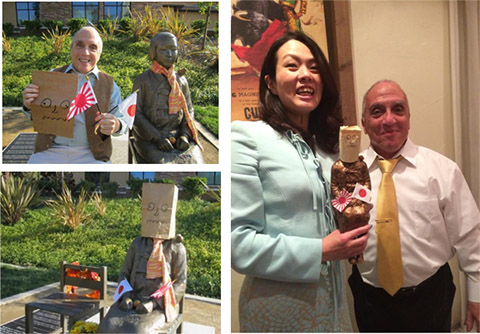Last week, we posted a group photo representing “the faces of Japanese ‘comfort women’ denialism” with names and affiliations of the historical deniers.

One of the “faces” featured, Tony Marano a.k.a. “Texas Daddy” a.k.a. “Propaganda Buster” commented on our blog, as well as on our facebook page, calling the caption “dishonarable and pathetic.” We responded to him, and here is the conversation that followed:

Here’s the text of the exchange, in case the screen capture does not work for you:
Tony Marano The title to the photograph is a total lie. Please point out which one(s) in that photograph deny the existence of Comfort Women.
Your scandalous lie is dishonorable and pathetic.
Japan-U.S. Feminist Network for Decolonization Nobody is accusing you of denying the mere existence of “comfort women.” Historical denialism is the denial of historical crimes, such as the Holocaust or the genocide of Native Americans or the crime Japanese military perpetrated against Korean and other women known as “comfort women” during the WWII. You deny the existence of the system of military enforced prostitution by the Japanese military, which means you, sir, are a “comfort women” denier.
Tony Marano You sir or ma’am are the denier between the two of us. In 1944 the United States Army captured, not rescued some Comfort Women and reported they were well paid prostitutes. That report place doubt in the version offered by many. That report may not reflect all the Comfort Women during that period throughout Asia, however it places doubt in the version that all were forced. By you and your colleagues refusing to acknowledge that report, it makes you the denier here. Also in the photograph where all are accused as deniers, do you know that for a fact about each individual? Or is that just another blanket inaccurate accusation?
Japan-U.S. Feminist Network for Decolonization The U.S. military report says that the women were deceived by the offer of good job and held in debt bondage, which is considered a form of slavery under the United Nations definition. The report also makes it clear that Japanese military managed the system of military prostitution by implementing policies, prices, schedules, etc. Finally, the report is contradictory in terms of the economic reality of the women: in some part it states that they “lived in near luxury” and in another they struggled financially because they had to purchase food and other necessities from “house maters” at an excessive cost. Most likely, the “luxury” story reflects the interrogation of the Japanese “house masters,” and the rest of the stories came from the women themselves. Now, who is “refusing to acknowledge” the report?
Tony Marano See, once again you are proving you are a denier. You left out the part where those so-called sex-slaves were paid more than the average Japanese soldier and where they ladies enjoyed entertainment and sporting events with members of the Japanese Imperial Army. Do sex slaves do that?
Japan-U.S. Feminist Network for Decolonization As I’ve pointed out already, the report states that women were nominally paid well but their earnings were taken away by the “house masters” for debt repayment and necessities. I find that description believable because it is very similar to the economic exploitation that occurs in contemporary human trafficking. As for comfort women having access to entertainment, even slave owners in the pre-Civil War U.S. South sometimes held picnics for their slaves. So yes, slavery can co-exist with occasional “entertainment” for the enslaved.
Who is this Tony Marano anyway, and why is he, a white American, so obsessed about denying the historical crimes of the Japanese Empire?
Tony Marano is a conservative video blogger who had posted political commentaries under the pseudonym “Propaganda Buster” on YouTube for several years. One time, he posted a video criticizing environmentalist group Sea Shepherd’s anti-whaling campaign against Japanese fishers, and was embraced as a hero by the Japanese right-wing nationalists. One of the Japanese supporters, Shunichi Fujiki (also pictured), approached Marano and became his official Japanese representative, supplying him with more pro-Japan resources and coordinating his books and lectures in Japan.
Marano is behind the whitehouse.gov petition calling for the removal of the Glendale, California memorial dedicated to the victims of Japanese “comfort women” system. Fujiki brags about a “strategy” he devised in order to attract attention to the petition, which was to send Marano to Glendale to have him take photos showing him place a paper bag over the head of the statue representing a “comfort woman.”

Pictures on the left show Marano and the statue with its head covered by a paper bag. The image on the right shows Marano visiting Mio Sugita, a far-right Japanese member of Parliament who is also protesting the memorial.
According to Fujiki, Marano was intentionally trying to provoke Korean outrage with his action, so that the media would cover the controversy, ultimately bringing more attention to the petition effort. Marano further explained that he placed the paper bag over the statue because he believed “comfort women” were ugly, citing a derisive description in the 1944 U.S. military report he mentioned in his facebook comment above.
We suspect that perhaps Morano had not engaged directly with critics of his historical revisionism, because most English speakers have never heard of him or do not know enough about historical documents about “comfort women” that he (selectively) cites, and he cannot read or understand Japanese criticisms. In addition, his messaging for the Japanese audience is carefully scripted and orchestrated by Fujiki, insulating Marano from direct confrontation. But once he exchanged opinions and facts with us on facebook, the “propaganda buster” had his propaganda busted and could not respond any further.



